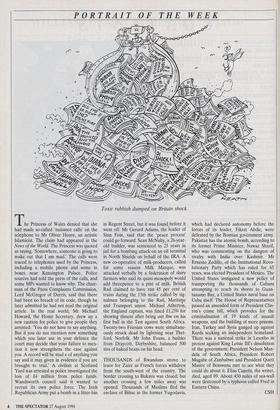PORTRAIT OF THE WEEK
Toxic rubbish dumped on Britain shock The Princess of Wales denied that she had made so-called 'nuisance calls' on the telephone to Mr Oliver Hoare, an artistic Islamicist. The claim had appeared in the News of the World. The Princess was quoted as saying, 'Somewhere, someone is going to make out that I am mad.' The calls were traced to telephones used by the Princess, including a mobile phone and some in boxes near Kensington Palace. Police sources had told the press of the calls, and some MPs wanted to know why. The chair- man of the Press Complaints Commission, Lord McGregor of Durris, said that there had been no breach of its code, though he later admitted he had not read the original article. In the real world, Mr Michael Howard, the Home Secretary, drew up a new caution for police to give people they arrested: 'You do not have to say anything. But if you do not mention now something which you later use in your defence the court may decide that your failure to men- tion it now strengthens the case against you. A record will be mad e of anything you say and it may given in evidence if you are brought to trial.' A civilian at Scotland Yard was arrested as police investigated the loss of £4 million from police funds. Wandsworth council said it wanted to recruit its own police force. The Irish Republican Army put a bomb in a litter-bin in Regent Street, but it was found before it went off. Mr Gerard Adams, the leader of Sinn Fein, said that the 'peace process' could go forward. Sean McNulty, a 26-year- old builder, was sentenced to 25 years in jail for a bombing attack on an oil terminal in North Shields on behalf of the IRA. A new co-operative of milk-producers, called for some reason Milk Marque, was attacked verbally by a federation of dairy farmers who said its quasi-monopoly would add threepence to a pint of milk. British Rail claimed to have run 45 per cent of trains during the 13th strike called by sig- nalmen belonging to the Rail, Maritime and Transport union. Michael Atherton, the England captain, was fined £1,250 for showing dissent after being out lbw on his first ball in the Test against South Africa. Twenty-two Friesian cows were simultane- ously struck dead by lightning near Thet- ford, Norfolk. Mr John Evans, a builder from Draycott, Derbyshire, balanced 500 tins of baked beans on his head.
THOUSANDS of Rwandans strove to leave for Zaire as French forces withdrew from the south-west of the country. The border crossing to Bukavu was closed, but another crossing a few miles away was opened. Thousands of Muslims fled the enclave of Bihac in the former Yugoslavia, which had declared autonomy before the forces of its leader, Fikret Abdic, were defeated by the Bosnian government army. Pakistan has the atomic bomb, according to its former Prime Minister, Nawaz Sharif, who was commenting on the dangers of rivalry with India over Kashmir. Mr Ernesto Zedillo, of the Institutional Revo- lutionary Party which has ruled for 65 years, was elected President of Mexico. The United States instigated a new policy of transporting the thousands of Cubans attempting to reach its shores to Guan- tanamo Bay, a United States naval base on Cuba itself. The House of Representatives passed an amended form of President Clin- ton's crime bill, which provides for the criminalisation of 19 kinds of assault weapons, and the building of more prisons. Iran, Turkey and Syria ganged up against Kurds seeking an independent homeland. There was a national strike in Lesotho in protest against King Letsie III's dissolution of the government; President Nelson Man- dela of South Africa, President Robert Mugabe of Zimbabwe and President Quett Masire of Botswana met to see what they could do about it. Elias Canetti, the writer, died, aged 89. About 450 miles of sea-wall were destroyed by a typhoon called Fred in Eastern China.
CSH


























































 Previous page
Previous page